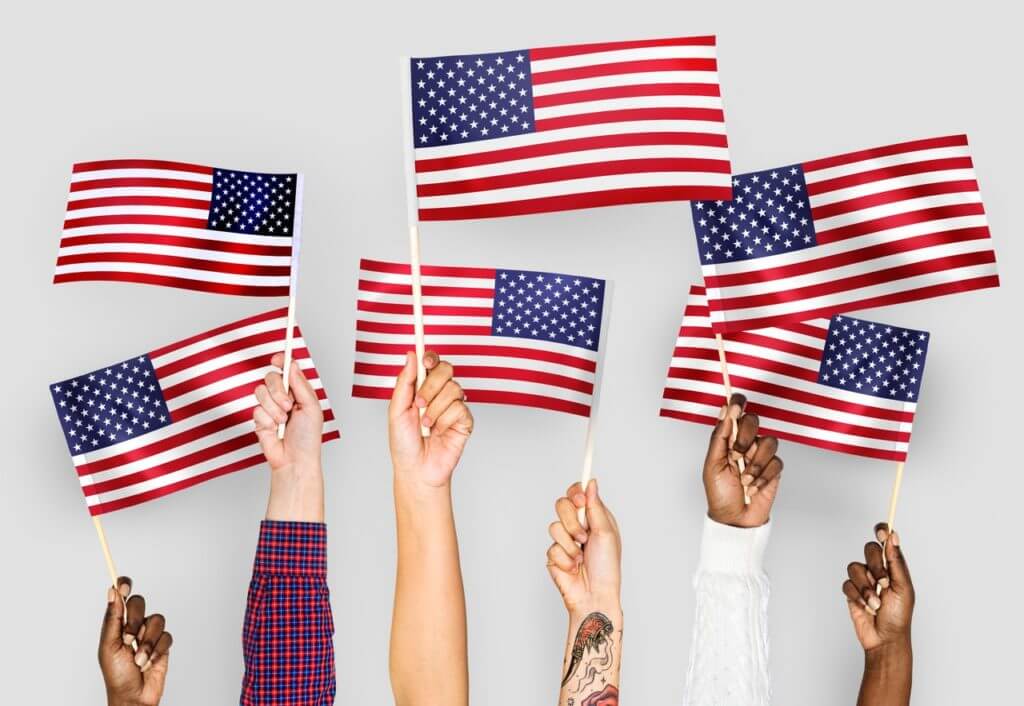Michael D. Purzycki
Submission to Braver Angels
Americans are an individualistic people. More than perhaps any other democratic nation on earth, we cherish our right to make as many of our own life decisions as we can, without taking our cues from others. But there are two powerful forces in America that, in different ways, push against this individualism.
Patriotism encourages each of us to sacrifice for our country, and to be willing to put our country’s needs before our own. Meanwhile, the increasing diversity of the American population, and the belief of many that this diversity benefits the country in various ways, encourages us to keep a person’s race, culture, and other characteristics in mind as we interact with them. Both these forces come in both shallow and deep forms.
Too many conservatives promote a shallow kind of patriotism, one that assumes all good citizens think the same way, and which sees dissent as contrary to the public good. Meanwhile, too many progressives promote a shallow kind of diversity, one that assumes everyone is a spokesperson for their demographic groups, whether they want to play that role or not. What we need is a deeper patriotism and a deeper diversity, each of which values citizens as individuals with their own combinations of values and beliefs, instead of pigeonholing them or criticizing them for failure to live up to our preconceptions.
Shallow Patriotism
The terrorist attacks of September 11, 2001, led to a dramatic upsurge in patriotic sentiment in America. However, some right-leaning politicians tried to monopolize this sentiment, to turn patriotism into a synonym for support for conservative policies and the administration of President George W. Bush. Two weeks after the attacks, White House Press Secretary Ari Fleischer reprimanded comedian Bill Maher, who had said “We have been the cowards lobbing cruise missiles from 2,000 miles away. Staying in the airplane when it hits the building, say what you want about it, it’s not cowardly.” Despite admitting that he had not read the full transcript of Maher’s remarks, Fleischer said, “they’re reminders to all Americans that they need to watch what they say, watch what they do.”
Fleischer’s statement took advantage of people’s fears in the aftermath of the deadliest attack by a foreign adversary in American history. Even in a time of crisis, it is dangerous for government officials in a democracy to hint that dissent and debate are unpatriotic. There are many ways citizens can show how much they love their country, including by speaking up when they believe their government is in the wrong.
More recently, this shallow patriotism has emerged in debates surrounding some professional athletes’ decision to kneel during the National Anthem to protest racism and police violence. President Trump urged team owners to fire players who refused to stand. And when Nike gave Colin Kaepernick an endorsement deal last fall, some critics reacted by boycotting the company, or even by burning Nike products they had bought.
Even if you disagree with or do not sympathize with the cause for which Kaepernick and others kneel, the fact that some people are kneeling does not get in the way of you standing and saluting. There is no need for everyone in a stadium to be in perfect unison in their passions. And besides, burning a company’s products is unlikely to harm their bottom line (after all, you’ve already given them your money.)
This February, a sixth-grade student in Florida refused to stand and recite the Pledge of Allegiance in class. The African-American student justified his refusal by arguing the United States was “racist” against black people. His teacher, citing her own Cuban heritage, told the student that if he did not want to live in America, “you can always go back, because I came here from Cuba, and the day I feel I’m not welcome here anymore, I would find another place to live.” After some shouting, the student was arrested. There is some dispute as to whether the arrest came because of the refusal to recite the Pledge, or because, as local police stated, the arrest “was based on the student’s choice to disrupt the classroom, make threats and resisting the officer’s efforts to leave the classroom.” Ultimately, the student was not prosecuted, and rightly so.
If you believe you and others like you are systematically treated unfairly by your country and your fellow countrymen, it will not be a surprise if you do not feel particularly patriotic. Or, if you consider yourself a patriot, you may very well be the kind of patriot who shows their love of their country by trying to improve it. Love of country can just as easily lead a person to try to make life better for their fellow citizens, as it can lead him or her to react harshly against the country’s critics. As President Obama put it in Selma, Alabama, on the fiftieth anniversary of the famous march for voting rights:
“What greater expression of faith in the American experiment than this; what greater form of patriotism is there; than the belief that America is not yet finished, that we are strong enough to be self-critical, that each successive generation can look upon our imperfections and decide that it is in our power to remake this nation to more closely align with our highest ideals?”
Shallow Diversity
If conservatives embrace too shallow a definition of patriotism, progressives make the same mistake with diversity. It is common for progressives to cite diversity’s benefits for corporations, universities, and other organizations. But merely stating that diversity is a strength does not necessarily convince people that it is one.
This problem is compounded when skepticism of progressive dogma about diversity is treated as a sign of bigotry. When Google engineer James Damore’s memo critiquing diversity policies at Google as ineffective was leaked, some critics derided it as “anti-diversity,” even though Damore conceded in his very first sentence, “I value diversity and inclusion.” Whatever the veracity of Damore’s arguments about gender, ability and interest (Heterodox Academy did a valuable service pointing out the strengths and weaknesses of his memo) it was plainly unfair to call him hostile to diversity. The fact that a person favors an unorthodox way to achieve a goal does not mean they oppose the attempt to reach the goal itself.
What’s more, a shallow conception of diversity assumes that everyone speaks, or wants to speak for their gender, ethnic group, or any other category they fall into. A Guatemalan-American woman, for example, may choose to advocate on behalf of Hispanics, or women, or Hispanic women, or all of them, some of them, or none. Any employer that hires her assuming that she will be an advocate for any group is stereotyping her, denying her individual agency. Representation is a choice for her and her alone to make.
In the Atlantic in 2017, left-leaning journalist Peter Beinart criticized the tendency, increasingly common among progressives, to equate any wariness about immigration with xenophobia. He observed that, little more than a decade ago, prominent progressives like Barack Obama and Paul Krugman could acknowledge that immigration had at least some downsides without fear of being vilified by the left. While making clear that he supported a liberal immigration policy, Beinart argued that progressives’ praise of difference was undermining Americans’ faith in diversity:
“Promoting assimilation need not mean expecting immigrants to abandon their culture. But it does mean breaking down the barriers that segregate them from the native-born. And it means celebrating America’s diversity less, and its unity more.”
Unfortunately, the response from the left to this nuanced approach included some unfair characterizations of Beinart’s argument. At Vox, for example, Dylan Matthews accused him of promoting an “anti-immigrant left.” Assuming there is only one good way to welcome immigrants to your country is just as wrongheaded as assuming there is only one true way to love that same country.
There is arguably more diversity of experience within races, as they are typically construed, than there is between them. The American experience of an immigrant doctor from Nigeria may be very different from that of an African-American with a high school diploma working behind a counter, even though both are black. The descendant of 18th century Scots-Irish settlers in West Virginia and the descendant of 20th century Jewish refugees from war-torn Poland may not have much in common except being officially labeled white. A Miamian whose parents escaped from communist Cuba and a San Franciscan whose family lived in California when it was part of Mexico may both be officially Hispanic, but there are likely major differences in their family stories. As well-intentioned as the left’s current conception of diversity may be, it does everyone a disservice by privileging a superficial kind of diversity over deeper
Deeper Patriotism, Deeper Diversity
There is at least one area of American life where much deeper forms of patriotism and diversity can and have come together: military service. Serving one’s country in uniform is one of the greatest levelers in our society. Taking a large number of people from wide-ranging socioeconomic, geographic, cultural, and cultural backgrounds, putting them all in the same clothes, and training them to follow strict procedures is very effective at getting them to put aside their differences and think more about their commonalities. Racial integration of the military after World War II, and the repeal of ”Don’t Ask Don’t Tell” much more recently, brought long-excluded groups closer to the American mainstream.
In a 2016 op-ed for the Wall Street Journal on campus protests, Jonathan Haidt and Lee Jussim expressed concern that the policies favored by protestors – many of which focused on increased diversity and emphasized racial identity – would increase distrust among students. They contrasted such approaches with the ways the U.S. Army dealt with racial dysfunction after the Vietnam War. Commanders back then invested time and effort into recruiting black soldiers and promoting those with potential to lead. If a particular soldier was falling behind the others in his training cohort, he received extra coaching and tutoring. But everyone was held to the exact same standard, and it was made clear to everyone that if a soldier was promoted, it was because they had demonstrated an ability to do the job, not that they were a diversity hire. By 1991, when America fought the Gulf War, the United States Army was, by many measures, a model of racial trust and respect.
We are long past the days when the need for huge numbers of American men to serve helped them get to know people from different regions and cultures through military service (while African-Americans were kept in separate units, members of different European ethnic groups often encountered each other for the first time while serving in World War II.) America today could benefit from a renewal of that kind of social cohesion. National service opportunities in the civilian world (like a major expansion of AmeriCorps and the Peace Corps) would be a good place to start.
A shallow form of patriotism is unrealistic and unfair in an increasingly diverse country. And a shallow approach to that diversity weakens the patriotic sentiments that could unite an otherwise fractured nation. By giving depth to our ways of loving our country and respecting our fellow citizens, we can better sustain our democracy.
Michael D. Purzycki is a writer in the Washington D.C. area who has worked in the Department of Defense. His views expressed here are his own.





2 thoughts on “Patriotism and Diversity, Shallow and Deep”
Leave a comment and let us know what your favorite blog post has been so far!
Keep up the amazing work!